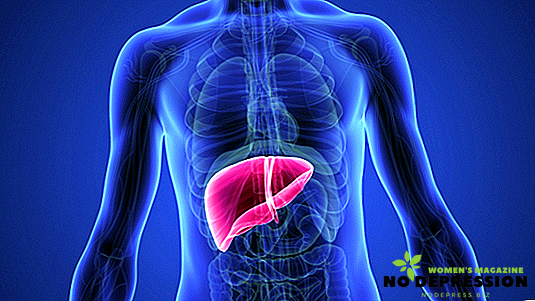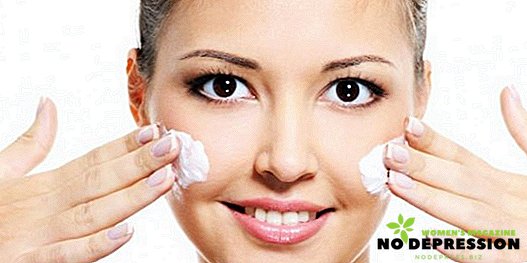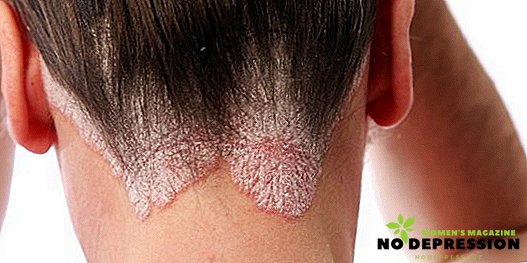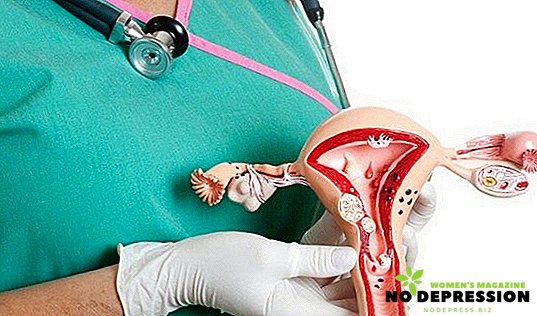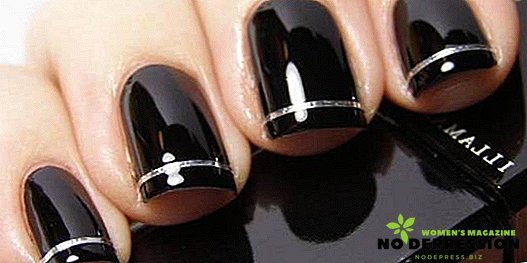The ears of a small child are still very unstable to external influences and can easily suffer from overheating or from cold. Bathing is also a risk factor.
Parents should be very careful not to start a painful condition, since even the smallest pain in the ears can lead to hearing loss or even to meningitis, which has irreparable consequences.
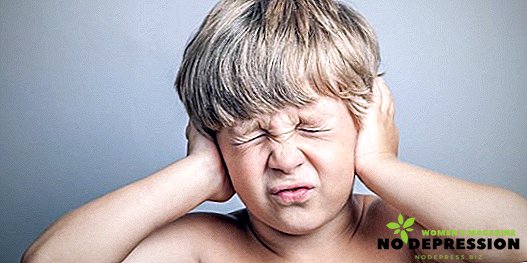
A child's ear aches after bathing: the main reasons
The most likely causes of pain in the hearing system are:
- water entering the outer or middle ear;
- barotrauma associated with pressure drops during immersion in water (especially common during sudden jumps in water parks);
- inflammation that develops due to hypothermia (it is possible that parents do not pay enough attention to the temperature during bathing);
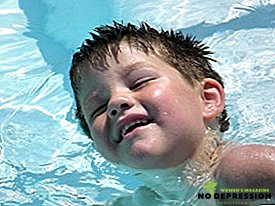
- the presence of pathogens in the water, which, when released into the auricle, infects the infection.
In this case, the ears of the baby have physical characteristics - unlike an adult, the child has a thicker and not so long auditory tube, due to which the probability of the disease increases. Children are especially affected by this disease during the first four years of life.
It is worth remembering that the ear, throat and nose are interrelated, therefore, when a runny nose appears, it is necessary to fight it in time, when sneezing, do not pinch the nasal sinuses, because such an action may inadvertently lead to a pressure jump, barotrauma or transfer of infected mucus .
Concomitant symptoms in children
Usually, shooting in the ear is accompanied by various symptoms that indicate the cause of the disease:
- congestion and tinnitus in the absence of hyperthermia most likely indicate barotrauma;
- a sensation of fluid transfusion is characteristic of various kinds of inflammation, as well as simply the ingress of water into the middle ear;
- Decrease in hearing level is inherent for any reason;
- fever - a sure sign of an infectious, inflammatory process of any etymology;
- yellowish discharge, swelling in the shell area - with inflammation;
- weakness, drowsiness.
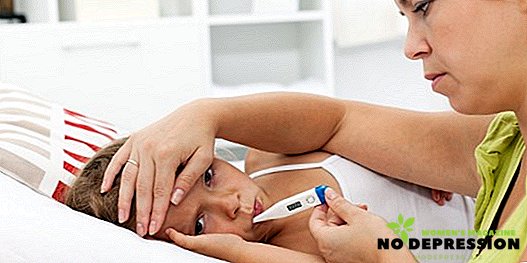
First Aid Child
Sometimes, unfortunately, the disease makes itself felt at the most inopportune moment. For example, at night. Baby can not sleep, suffering, crying. Among the first response measures for pain in the ears, the most popular are:
- boric alcohol treatment - a thin board with a clamped piece of cotton inside is impregnated with the substance and wrung out well, then placed in the ear, while not allowing the boric alcohol to fall into the ear canal (it is important not to forget that the alcohol is not heated, it is allowed to reach room temperature in the refrigerator) temperatures are natural, for example, palm temperatures;
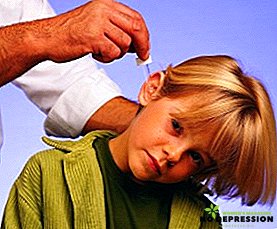
- in the presence of rhinitis - first of all it is necessary to fight with him, suitable drugs based on sea salt or vasoconstrictor;
- a compress of dry heat — using a heating pad (including an electric one) or a regular plastic bottle, wrapped in a double layer of cloth and filled with hot water, will also suit a warm, calcined salt in a container or a rag bag;
- alcohol treatment - it is easy to defeat pathogenic bacteria, should be applied immediately after bathing, pharmaceutical alcohol is taken as a basis, based drinks - like vodka do not work, cotton swabs are placed in the ears, then a dressing is made;
- hydrogen peroxide - many otolaryngologists advise peroxide to drop into the ear canal in the same volume, so that the substance itself is poured back, "grabbing" particles of earwax, purulent deposits;
- Paracetamol - a tool that has been proven for more than one decade, will help relieve pain and reduce temperature
Before giving the child first aid, it is necessary to observe the symptoms. Dry heat, for example, will not be beneficial for infectious diseases, since various small organisms in such an environment multiply rapidly - thus, purulent processes are an indicator of action.
Drug treatment
The prescriptions, of course, are prescribed by the doctor, each in their practice knows which means are more effective. Moreover, it is not worth risking the health of the baby, since serious complications are possible.
And it is better not to use the drugs "blindly", even if the last time prescribed a certain set, although the symptoms may be the same. The most commonly used drugs are:
- petrolatum and hydrogen peroxide - to eliminate excess sulfur;
- Vishnevsky ointment, cedar oil - if a fungus got into the ear with water, wash the ear with peroxide;
- antibiotics - injections that suppress the inflammatory process and are needed to prevent meningitis, brain abscess;
- ear drops - the main tool in the development of otitis, but their use is possible only under the strict supervision of a physician, because steroids are prescribed that are not intended for young children, an independent choice of drops can lead to unpredictable consequences, since they are all strictly specialized: "Otipaks", "Albucidus" and "Otirelax" are allowed for the youngest children, "Otinum" is indicated for children from one year old, "Kandibiotik" is a medicine for older age - after 6 years;
- cold is treated in a complex, using drugs with a combined (anti-inflammatory action) - Sinupret, Rhinoflumitsil;
- otitis of internal character radiates exclusively in the hospital, with the use of dehydration preparations, and sometimes with operational impact - tympanoplasty.

How to treat the ear folk remedies
Despite the development of scientific medicine, folk is still popular. However, you should not start self-treatment if it is a child, and wait for the doctor's decision.
For example, warming up with purulent inflammation worsens the situation, drops can negatively affect the membrane, cause deafness.
Thus, if the doctor sees the need, you can use "dry heat", as described above.
Another method of treatment - instillation of herbs or oils:
- Chamomile infusion, known for its anti-inflammatory properties: brew a teaspoon in a glass of boiling water, strain and rinse your ear three times a day;
- brewed lemon balm - just like chamomile - to wash;
- honey and propolis tincture alcohol - mix in a spoon and drop by drop in each ear.

Doctor's recommendations
The most authoritative pediatrician, Dr. Komarovsky, gives general recommendations for the prevention of the disease:
- cool air in the room where the baby sleeps;
- rather high humidity in the room - more than 50%;
- proper drinking regime - mucus is thinned, which affects inflammatory processes;
- first of all, pay attention to the presence / absence of rhinitis.
 In order to recognize otitis media, according to the doctor, it is enough to observe a baby who can scratch an ear, whimper, does not want to eat, does not sleep. You can diagnose the disease yourself - when you click on the "trestle" - the protrusion in front of the ear canal - the child begins to cry.
In order to recognize otitis media, according to the doctor, it is enough to observe a baby who can scratch an ear, whimper, does not want to eat, does not sleep. You can diagnose the disease yourself - when you click on the "trestle" - the protrusion in front of the ear canal - the child begins to cry.
Such a manifestation gives all the reasons for an urgent visit to the doctor. Komarovsky argues that a cold after bathing in the advanced stage most often leads to otitis media.
If a child has average (catarrhal) otitis, and these are the most frequent cases, there is ear noise, loss of appetite, pain, both in the ears and in different parts of the head, hearing loss. Also a characteristic symptom is fever.
Catarral otitis often occurs in infants due to the nature of the anatomical structure of the head in children. If the disease is with serous inflammation, then the pain will be sharp.
As a rule, there is also general malaise, weakness.
Labyrinthitis is accompanied by unexpected hearing loss, dizziness, nausea and loss of balance. This type of otitis media is a complication of otitis media or occurs with severe general infection in children.
Ear hurts after swimming in an adult: what to do?
Ear pain may be associated with ailments of the teeth or the trigeminal nerve. For adults, the test is also suitable by pressing on the tragus. Advice for adults is almost no different from children's:
- you should use nasal drops, narrowing vessels, like "Xilen", "Vibrocil";
- for restraining "lumbago" it is better to use analgesics - "Paracetamol", "Ibuprofen";
- to lay tururens of cotton wool soaked in alcohol - only if there are no purulent manifestations;
- in case of non-purulent diseases - use drops, like “Otinum”, make a warming compress;
- carry out a careful toilet of the ear with hydrogen peroxide.
Why does ear ache after swimming in the sea
Sea water, although beneficial, can trigger ear diseases. Often, after frequent diving, there is deafness, a sensation of a foreign body in the ear canal, hyperthermia and “shooting-ups” appear. All this can spoil the rest, so you should take care of the ears from the very beginning of your stay on the seashore.
 Avoid contact with water in the first place, will help the special "earplugs" that are made of rubber and plastic, suitable for multiple use.
Avoid contact with water in the first place, will help the special "earplugs" that are made of rubber and plastic, suitable for multiple use.
They are inexpensive, there is an assortment of any sports store. Another way is a cotton ball, which rolls quite tightly and is lubricated with petroleum jelly.
Natural protection against harmful microorganisms is “native” sulfur. Therefore, do not brush your ears at least five to ten days before diving. It is not recommended to try to get rid of water in the ears with your fingers - this is risky due to possible microcracks.
How to get rid of water in the ear
Doctors do not recommend jumping, so that the water flows out of the ear, as they do not recommend and torment the ear canal with your finger. The most correct and effective doctors consider cleansing the ears with cotton buds. You can remove the water with the help of swallowing movements, lay down on the right side or make a compress.
In the middle ear, water can appear when mistakes are made in diving or water entering the nose. Decongestants for the nose will help deal with the problem. If it is impossible to cope with the disease on its own, it is necessary to immediately consult a otolaryngologist, because the fluid inside is thickening, rotting begins.

Protection measures
The text has already met recommendations for the protection of the body against diseases of this kind, but it is worth repeating that the basic rules of protection include:
- exclusion of contact with water;
- ear cleansing only with the help of peroxide and a special stick;
- Do not be zealous in cleansing your ears, remember that sulfur is a natural defense mechanism.
One way or another, everyone should remember that it is better to prevent a disease and take care of oneself than an illness.
And some more information on the topic of the article is in the next video.





